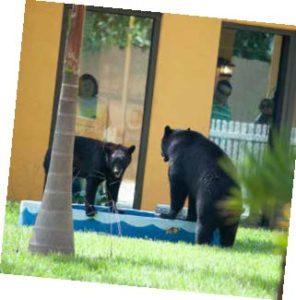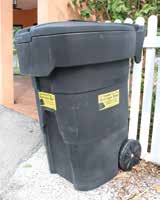ARE YOU SMARTER THAN THE AVERAGE BEAR?
by Tim L. Tetzlaff
Naples Zoo Director of Conservation
 Did you know there are more than 1,000 bears in south Florida? Following years of threatened status, bear populations are on the recovery. They’ve been seen anywhere from Golden Gate Estates to Port Royal.
Did you know there are more than 1,000 bears in south Florida? Following years of threatened status, bear populations are on the recovery. They’ve been seen anywhere from Golden Gate Estates to Port Royal.
Like other Americans who live in bear country, Floridians can also coexist with bears, but only if we take some common sense steps. Doing so will keep each other safe and let bears stay in the wild, and prevent costly financial mistakes for businesses, homeowners, and HOAs.
THE NOSE KNOWS
Bloodhounds have legendary abilities to track down scents. But did you know a bear’s sense of smell may be up to seven times better? The smell of trash can lure them out of the woods from at least a mile away and possibly much, much farther. And your trash is their treasure. Knocking over a garbage can and eating the leftover pizza and food scraps spread across your lawn can save a bear hours of foraging. And that means they’ll be back. Sadly, if a bear overcomes its fear of people, it’s more likely to be struck by vehicles, illegally shot or may be euthanized if it presents a threat to people. Simply put, fed is dead.
SPARE A BEAR
 So if you see a bear starting down the path to losing its fear by coming in for garbage or other attractants, call the Wildlife Alert Hotline at 888.404.3922. (TIP: Program that number into your phone now.) Florida Fish and Wildlife Conservation Commission (FWC) biologists may be able to haze the bear and teach you methods to dissuade bears from hanging around. By reporting early, the bear can be taught to stay away.
So if you see a bear starting down the path to losing its fear by coming in for garbage or other attractants, call the Wildlife Alert Hotline at 888.404.3922. (TIP: Program that number into your phone now.) Florida Fish and Wildlife Conservation Commission (FWC) biologists may be able to haze the bear and teach you methods to dissuade bears from hanging around. By reporting early, the bear can be taught to stay away.
DON’T WAIT UNTIL IT’S TOO LATE
Some people worry about reporting a nuisance bear because they fear the bear will be euthanized. Unfortunately, that concern for the bear can turn deadly as it almost insures the bear will get bolder and bolder, making it even more likely he may not be able to stay in the wild. You’ll spare that bear and make a biologist’s day by calling because they dedicate their careers to these bears and have the heartbreaking job of putting down bears that people didn’t report in time.
STASH YOUR TRASH
 So what can you do to help? During the week, it’s best to secure trash in a bear-resistant trashcan like the one
So what can you do to help? During the week, it’s best to secure trash in a bear-resistant trashcan like the one
you can see by the bears in Naples Zoo. Or you can put it in a garage or other protected storage like a secure
shed. Then wait until the morning on trash pickup day to put the garbage and recycling out so the bears don’t turn your street into a messy midnight buffet. By keeping our trash secure all the time, we avoid luring black bears into
our neighborhoods with the promise of an easy meal. That means bears are less likely to encounter people and pets – or do property damage.
LIABILITIES AND FEES
Property owners can be held liable for not using reasonable care to discover dangerous conditions and to protect their guests from those conditions. Thus, not warning a tenant, guest or Airbnb renter about known bear activity and risks could potentially have very costly implications should an injury occur. And since current law equates a homeowners’ association (HOA) and a homeowner’s relationship like a landlord and tenant, it creates a similar liability.
Without appropriate education or policies, HOAs could be held liable for an attack. And if the HOA liability insurance has exclusion endorsements or caps on claims, homeowners can be responsible for making up the difference. That means a lawsuit could result in special assessments being levied on residents by the HOA to cover the additional costs – similar to those levied to pay for Hurricane Irma recovery. Given a recent human injury by a bear here in Naples, it may be a good time to review policies for your HOA, business, or school and put educational programs and “bearwise” practices in place for both public safety and the wellbeing of bears – as well as the fiscal bottom line. If you’d like to have a presentation for your community about all this from FWC, contact bearevents@myfwc.com. You can also ask about offering space for their educational mobile
billboard to raise awareness.
PETS AND VETS
 Many bear-related attacks on humans involve dogs. To keep you and your pets safe, follow some best practices available at www.napleszoo.org/bear. And if your business welcomes pet owners, contact me at tim@napleszoo.org to get free posters created by Naples Zoo and FWC with this information to post in veterinary exam rooms, pet shops, and other places where pet owners visit.
Many bear-related attacks on humans involve dogs. To keep you and your pets safe, follow some best practices available at www.napleszoo.org/bear. And if your business welcomes pet owners, contact me at tim@napleszoo.org to get free posters created by Naples Zoo and FWC with this information to post in veterinary exam rooms, pet shops, and other places where pet owners visit.
GET YOUR STICKER
As parents, grandparents and neighbors who care about children and pets in our neighborhoods as well as wanting to keep bears where they belong, you can commit to secure your garbage during the week and wait until the morning on trash days to put garbage and recycling out. By committing, you can get your own smarter-than-the-average bear sticker for your neighbors that you care. Visit www.napleszoo.org/bear to sign up and get resources on all these issues.
Far from the simple menageries of the past, today’s nationally accredited zoos are centers of learning and natural crossroads for biologists, educators, environmental scientists and researchers – as well as for students, conservationists and all animal lovers. Naples Zoo at Caribbean Gardens is a trusted, private 501(c)(3) nonprofit serving wildlife and families here and around the world. More information at www.napleszoo.org.




Leave a Reply
Want to join the discussion?Feel free to contribute!